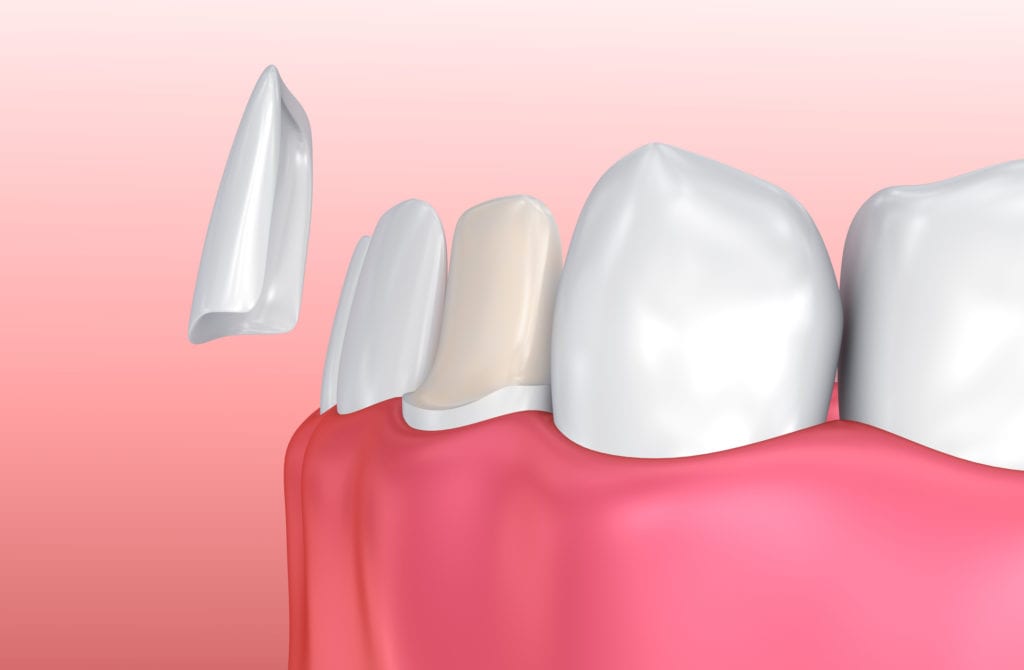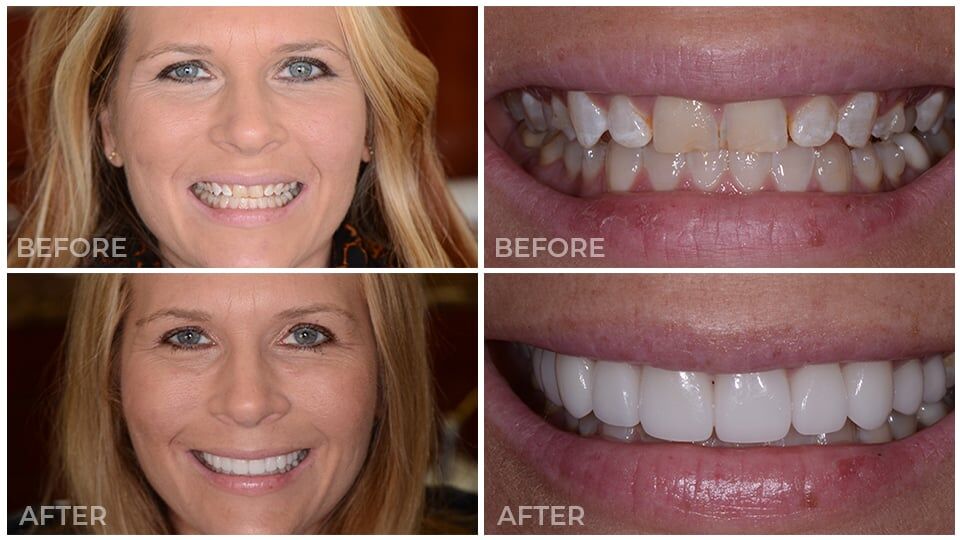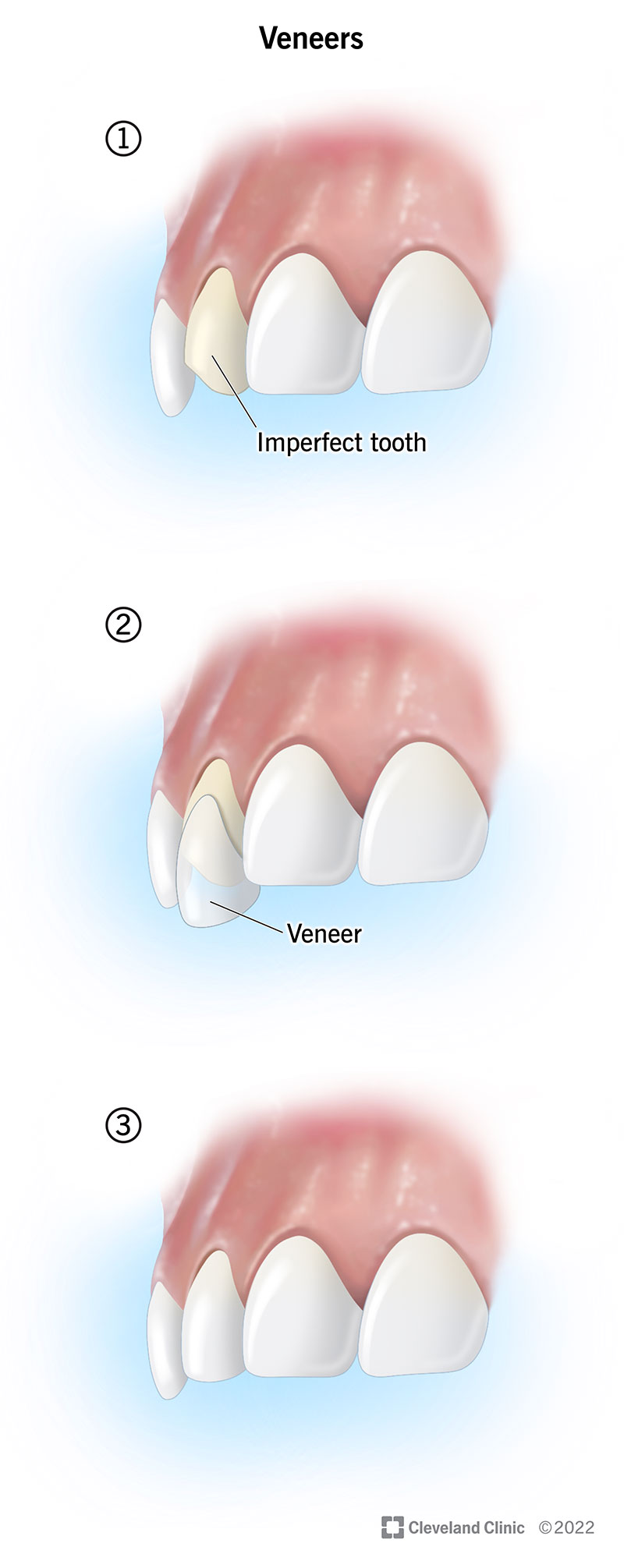Understanding Veneers Teeth Options for a Brighter, Confident Smile
Wiki Article
Unlocking the Tricks of Veneers: Truths, Kinds, and Advantages for a Gorgeous Smile
Veneers provide a compelling solution for those seeking to enhance their smiles. These dental improvements can resolve different blemishes, from discoloration to misalignment. With alternatives like porcelain and composite, people can pick based on their choices and requirements. Nevertheless, recognizing the subtleties of veneers, consisting of application and care, is crucial. What variables should one take into consideration before making a choice? The solutions might amaze those thinking about this aesthetic dental choice.
Understanding Veneers: What Are They?
Veneers are slim, tailor-made coverings designed to cover the front surface area of teeth, improving their appearance. Normally crafted from durable materials, these coverings are tailored to fit each person's teeth specifically. They offer several functions, including correcting visual flaws such as discoloration, chips, or gaps. The application procedure includes a dental professional preparing the teeth, frequently by eliminating a tiny quantity of enamel to ensure a tight fit. When prepared, the veneers are adhered to the teeth using a solid adhesive.Clients typically pick veneers for their capability to develop a natural-looking smile while providing a long-lasting option to oral flaws. Unlike other aesthetic dentistry options, veneers need minimal invasive procedures, making them a popular option. The outcome is a better smile that can substantially boost a person's self-confidence and self-confidence. In general, veneers offer a reliable strategy to achieving a more attractive and unified dental look.
Sorts of Veneers: Porcelain vs. Composite
When taking into consideration aesthetic dental alternatives, two main kinds of veneers stand apart: porcelain and composite. Porcelain veneers are crafted from a durable ceramic product that simulates the natural appearance of teeth. They are known for their tarnish resistance and capability to mirror light similarly to natural enamel, offering a visual appeal that several individuals desire. The application procedure typically entails more prep work of the tooth framework and may need numerous visits to the dental practitioner.On the other hand, composite veneers are made from a tooth-colored resin that is directly used to the teeth. This kind enables quicker application and can typically be finished in a single see. While they are cheaper than porcelain veneers, they might not supply the very same durability or resistance to staining. Eventually, the selection between porcelain and composite veneers relies on individual preferences, budget, and specific dental needs.
The Benefits of Finding Veneers
Selecting veneers supplies many benefits that can considerably improve both the visual appeals and functionality of a person's smile. One of the primary advantages is their ability to remedy flaws such as staining, voids, and misalignment, resulting in a much more consistent look. Veneers can also enhance the sturdiness of teeth, giving a safety layer that shields them from damages.They need minimal tooth preparation compared to various other dental treatments, preserving more of the all-natural tooth framework. This conservation adds to a much healthier dental atmosphere while still accomplishing a stunning smile.
Veneers are extremely adjustable, allowing individuals to pick the shape, size, and color that best matches their preferences. In addition, they are stain-resistant, making it less complicated to preserve a bright and eye-catching smile with time. Overall, veneers provide an effective choice for those looking for both aesthetic enhancement and long-term oral health benefits.
The Veneer Application Process
The veneer application procedure entails numerous crucial actions to assure perfect results. An examination is conducted to evaluate the client's needs, followed by the preparation and shaping of the teeth. Ultimately, the veneers are bound in place, with modifications produced a perfect fit and look.First Assessment Tips
A complete initial assessment is necessary for anyone taking into consideration veneers, as it sets the structure for a successful therapy. During this meeting, the dental expert reviews the individual's dental wellness, going over any existing problems that might impact the veneer application. This evaluation might consist of X-rays and an aesthetic evaluation to establish the problem of the periodontals and teeth.The dental professional additionally engages the patient in a comprehensive discussion about their visual goals, preferences, and assumptions. They might present different veneer alternatives tailored to the person's certain requirements. Additionally, the expert discusses the procedure, prospective risks, and aftercare needs, making sure that the person is well-informed and comfy prior to waging the therapy.
Preparation and Forming Teeth
After the preliminary assessment, the following stage entails the prep work and shaping of the teeth to suit the veneers. This important step is performed by the dental practitioner, who thoroughly assesses the tooth framework to figure out the amount of enamel that needs to be eliminated. Normally, a thin layer, generally around 0.5 millimeters, is cut off to guarantee a correct fit for the veneers. Accuracy is paramount throughout this procedure, as it affects both the aesthetic result and the general convenience. As soon as the teeth are appropriately shaped, perceptions are taken to develop custom-made veneers that align flawlessly with the client's oral account. This thorough preparation establishes the phase for a successful veneer application, enhancing both look and feature.Bonding and Final Adjustments
Complying with the shaping and prep work of the teeth, the bonding procedure starts, marking a vital stage in the veneer application. During this phase, an oral adhesive is used to the prepared tooth surface, ensuring a strong bond in between the tooth and the veneer. The dentist meticulously places the veneer, making adjustments to accomplish the desired positioning and aesthetic appeals. Once properly positioned, an unique light is used to cure the adhesive, strengthening the bond. After curing, the dental expert conducts last changes, trimming any kind of excess product and improving the veneer's form to ensure a natural look. This mindful interest to information improves both function and looks, contributing to a general stunning smile that is durable and resilient.Taking care of Your Veneers: Maintenance Tips
Caring for veneers is important to maintain their look and durability. A consistent day-to-day cleansing routine, mindful avoidance of staining foods, and normal dental check-ups are essential elements of efficient maintenance. These practices help ensure that veneers continue to be in peak condition and proceed to boost one's smile.Daily Cleansing Regimen
Frequently maintaining veneers is essential for their long life and look. A proper day-to-day cleaning routine can aid preserve their shine and stop damages. Dental practitioners suggest brushing twice a day with a soft-bristled toothbrush and fluoride tooth paste, guaranteeing that all surface areas are cleaned up carefully to prevent scraping the veneer surface. Flossing everyday is likewise vital to eliminate food fragments and plaque from in between teeth, where brushes might not get to. In addition, making use of an antimicrobial mouth wash can assist maintain dental health without damaging the veneers. It is recommended to stay clear of unpleasant cleaners and devices that can scrape the veneer. By adhering to these simple steps, people can keep their veneers looking stunning while advertising total oral wellness.Staying Clear Of Discoloration Foods
Veneers are developed to enhance the appearance of teeth, their sensitivity to discoloring requires cautious nutritional selections. It visite site is important for people with veneers to be conscious of particular foods and drinks that can lead to discoloration. Dark-colored things such as coffee, red white wine, and berry juices need to be consumed in moderation, as they are recognized to stain both natural teeth and veneers. In addition, acidic foods like citrus fruits container compromise the bonding agents utilized in veneers, making them much more vulnerable to staining. To maintain an intense smile, it is a good idea to wash the mouth with water after consuming staining foods and to exercise routine dental health. These thoughtful selections add considerably to the long life and aesthetics of veneers.
Normal Oral Check-ups

Preserving the honesty of veneers needs a dedication to normal oral check-ups, as these consultations play a vital function in ensuring their longevity and appearance. During these sees, dental specialists can evaluate the problem of the veneers, looking for any indications of wear, damage, or underlying dental concerns. Additionally, routine cleanings help here remove plaque and tartar that can build up around the veneers, promoting general oral wellness. Dental experts can likewise give personalized guidance on care techniques and items fit for veneer maintenance. By sticking to a timetable of examinations, people can attend to potential problems early, ensuring their smile stays vibrant and lovely. Eventually, routine oral sees are a vital element of veneer care.
Is Veneers the Right Option for You?
Making a decision whether veneers are the right choice often rests on specific visual goals and dental demands. For those seeking to address problems such as staining, chips, or misalignment, veneers can offer a transformative service. Candidates generally consist of individuals with healthy and balanced teeth however prefer an improved smile.
It is crucial to take right into account factors such as tooth enamel condition, the extent of oral concerns, and the willingness to maintain veneers. Consulting with a dental professional is crucial, as they can review oral health and wellness and figure out if veneers appropriate
In addition, prospective prospects should mirror on the long-lasting commitment, as veneers may need substitute every 10-15 years. Cost factors to consider also play a substantial duty, as veneers can be a substantial financial investment. Ultimately, the choice should be knowledgeable, stabilizing visual wishes with practical considerations for long-term results.
Regularly Asked Inquiries
How Long Do Veneers Normally Last Before Needing Substitute?
Veneers normally last in between 10 to 15 years prior to requiring substitute. Aspects such as dental hygiene, lifestyle choices, and worldly top quality can influence their long life, making routine oral exams essential for maintaining their condition.Are Veneers Safe for People With Delicate Teeth?
Veneers can be secure for people with delicate teeth, yet it usually relies on the seriousness of level of sensitivity and the dental expert's technique. Consulting an oral professional before proceeding is important to ensure excellent results.Can Veneers Be Removed or Replaced Easily?

Do Veneers Stain Over Time, and Exactly How Can I Prevent It?
Veneers can discolor in time, particularly from foods and drinks like coffee or red white wine. To stop discoloration, maintaining good oral health, making use of a straw for drinks, and normal dental cleanings are advised practices.What Is the Cost Array for Getting Veneers?
The price of veneers generally varies from $500 to $2,500 per tooth, depending upon variables such as material type, dentist experience, and area. Patients should talk to oral experts for customized quotes and financing options.Once the teeth are appropriately shaped, see here now perceptions are taken to create personalized veneers that line up completely with the person's dental account. During this stage, an oral adhesive is applied to the prepared tooth surface, assuring a solid bond between the tooth and the veneer. It is crucial to take right into account variables such as tooth enamel condition, the level of dental issues, and the desire to maintain veneers. Veneers can be secure for people with delicate teeth, yet it commonly depends on the intensity of level of sensitivity and the dental practitioner's method. The expense of veneers generally ranges from $500 to $2,500 per tooth, depending on aspects such as material type, dentist experience, and location.
Report this wiki page